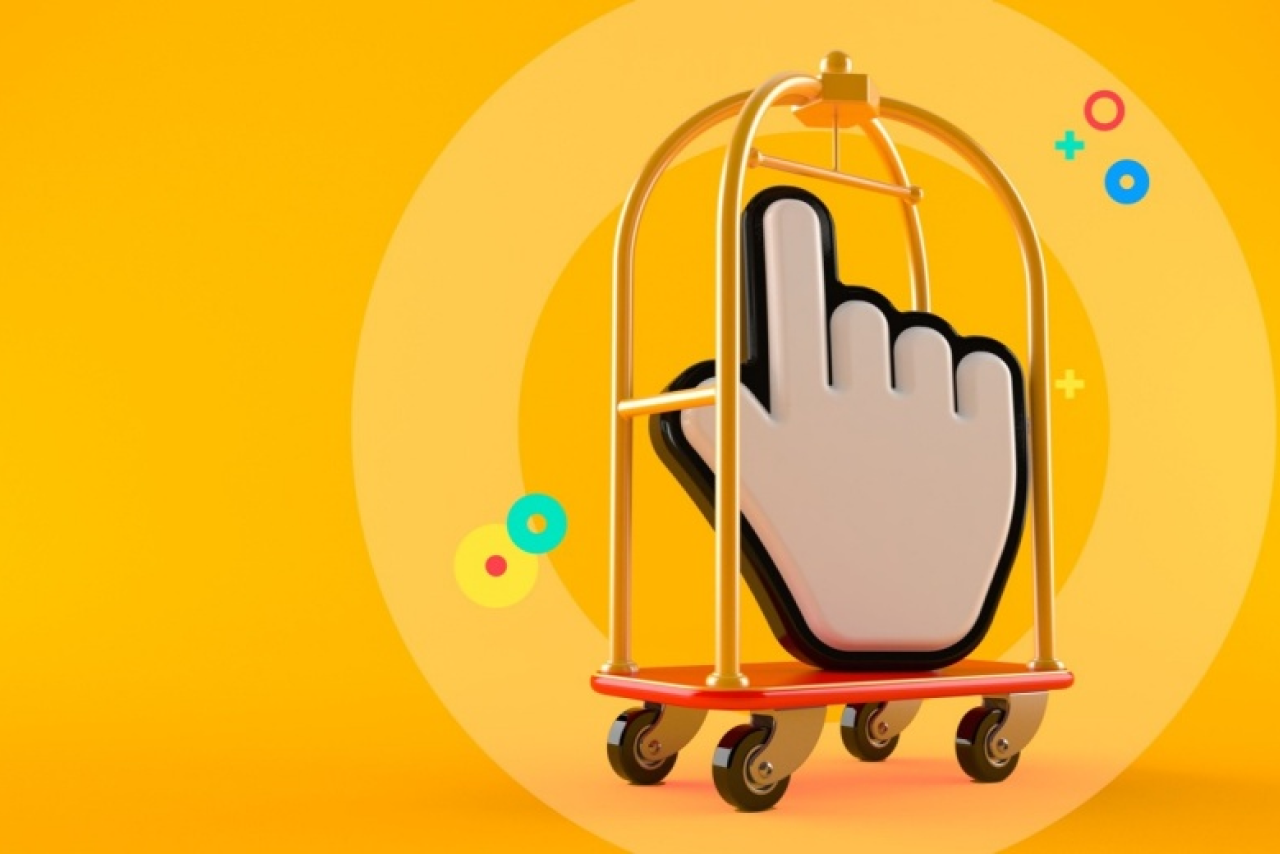What issue can we solve for you?
Type in your prompt above or try one of these suggestions
Suggested Prompt



The Top 5 Hospitality Industry Technology Trends in 2025
Exploring the game-changing innovations shaping the future of hospitality
In 2025, the hospitality industry stands at a pivotal crossroads: The expectations of travelers have shifted, and hotel companies must evolve or risk falling behind. They can no longer rely on outdated strategies. Guests globally expect not only better experiences but also service that is personalized that is tailored to their needs and lifestyles. Hotel companies cannot use pre-pandemic playbooks for today’s traveler. Hoteliers will need to leverage new technologies in both the front of the house and back end, form partnerships to address the evolving travel landscape, create value for employees and guests, and set themselves up for success in the years ahead. As the hospitality industry continues to recover and adapt in the wake of the pandemic, 2025 presents a crucial year for hotel companies to tackle a range of evolving challenges.
From staffing shortages to the increasing demand for digital convenience, hotels must rethink their strategies to remain competitive in a rapidly changing market. In this article, Publicis Sapient hospitality experts break down the top five trends that will shape the industry a year from now, based on our market research and industry expertise.

Integrated employee management platforms
Five years after the COVID-19 pandemic, the hospitality industry still suffers from staffing shortages and needs to adapt. According to a 2024 American Hotel & Lodging Association survey, 76 percent of hotels reported staffing shortages, with 13 percent experiencing severe gaps due to the lack of workers. As business travel rebounds, hotel companies face an uphill battle in maintaining service standards without the steady influx of minimum wage workers they once relied on.
To address this, the hospitality industry is beginning to embrace a crucial shift: equipping employees with technology that enhances productivity while elevating guest experiences. This movement goes far beyond basic scheduling apps. Increasingly, hotels are investing in AI-powered employee management platforms capable of delivering real-time insights, streamlining workflows and enabling personalized service. These platforms leverage AI to optimize processes such as data processing, workflow automation and fraud detection. For example, some systems use AI to mine data from public platforms, while others offer intuitive, chat-based interfaces where employees can configure workflows seamlessly.
Hotels need to think of new strategies and incentives to attract and retain workers. One promising approach is creating integrated hospitality employee ecosystems. Hotels that form alliances with airlines, airports, restaurants or even other hotel groups can create flexible platforms that allow employees to move from one location, and one brand, to another. These integrated ecosystems will improve employee retention and satisfaction and increase customer satisfaction at the same time. For example, global hospitality companies can unify multiple employee software platforms across brands, allowing employees to easily transfer to different hotel locations or even different locations under different brand names. This would allow hotels to catch up to the “future of work” flexibility that many hospitality workers are craving as they leave the industry. To make this happen, hotel companies will need to direct much more of their focus to software and data. In order to develop a strategy around which brands to partner with and what the back-end platform should look like, companies need to understand what their employees want—whether it’s more flexibility in hours, location or job function.
Forecasting hotel occupancies with AI
The current state of travel in the U.S. is in flux. While 2024 hotel occupancy demand didn’t quite lived up to expectations, regions in the Middle East and across the EU experienced the opposite Dubai saw an average daily rate (ADR) growth of 4.6 percent in 2024 compared to the first half of 2023, with upscale hotels’ ADR jumping to 10 percent. Moreover, the European hotel industry saw a 9.8 percent increase in upscale accommodations in 2024. This indicates a global trend in the luxury hotel sector, as STR, a hospitality data analytics firm, predicts demand growth in 2025 within corporate travel and in upper-tier hotels in the U.S. Return-to-office mandates are a culprit of this trend. This presents an opportunity for hoteliers that's ripe for disruption. Predictive AI can be used to not only forecast hotel vacancies and occupancy rates but also hotel demands and operational costs by analyzing large amounts of data. For example, if cities host annual music and arts festivals, massive sports events, or business conferences, AI can help hotels price rooms dynamically for the coming year based on attendance data.
Premium hotel chains are already utilizing these AI-powered predictive models. Wyndham Hotels & Resorts for example, uses predictive analytics, for competitor pricing and market trends to maximize revenue and optimize room rates.
Connected guest experience platforms
From hotel chatbots to smartphone-controlled lighting, more and more of the hotel experience is being digitized—but that doesn’t mean the overall guest experience should become less personalized. Hotels are now investing more in connected guest experience platforms to create seamless, personalized guest journeys. These platforms integrate various technologies and services, moving beyond the capabilities of basic customer relationship management (CRM) tools to focus on real-time data and personalization.
These investments come at a key time for luxury hotel developments across the globe, particularly in the Middle East. In this region, countries like Qatar, Saudi Arabia, and the UAE are boosting air connectivity with more airports and added flights. As a result, domestic and international tourists will expect a delicate balance of advanced technology and a personalized human touch. For the luxury hotel sector, brands must compete beyond amenities and aim to become lifestyle brands that combine tech and ultra-luxury experiences.
Key innovations include digital wallet integration for room entry and payments, mobile-first apps for guest services, and biometric check-ins.
Improved guest experience tech, like mobile hotel room service, can allow guests to track their order time, see photos of menu items and place orders automatically in the kitchen’s back end. AI plays a crucial role as well, enabling personalized recommendations and predictive analysis. Virgin Hotels mobile app Lucy is a virtual assistant that balances customer experience and digital convenience. Lucy allows guests to request additional pillows and bedding, laundry pick-up, valet and room service with just a tap.
However, in order to deliver a seamless digital experience via technology, hotel companies will also need to integrate multiple legacy systems to create cloud-based platforms. This will enable them to serve guests throughout their entire journey and integrate data points online and offline across channels.
Data-driven marketing personalization
As travelers embrace AI-powered “clickless” booking experiences, data-driven marketing personalization is becoming essential for hotels to remain competitive. Data-enriched marketing tools, such as Publicis Sapient’s and Salesforce’s Marketing Cloud Solution, allow hospitality brands to unify customer interactions—including customer planning, journey engagement, next best actions, and social engagement s—into actionable profiles, delivering deeply relevant guest experiences.
The trend is fueled by advancements in AI and the rising importance of personalized advertising. Platforms like OpenAI and Perplexity are already exploring ad models where brands bid for “sponsored” placement in AI-generated travel suggestions. To stay relevant, hotels must adopt marketing platforms that integrate loyalty preferences, booking behaviors, and regional trends to deploy hyper-targeted campaigns in real time.
Many hotels are already centralizing campaign management, allowing them to deploy promotions across multiple channels efficiently while ensuring consistent messaging. AI algorithms enable them to identify and act on customer preferences, automatically adjust campaigns, and optimize spending. These efforts simultaneously enhance direct bookings through tailored offers while maintaining reach on online travel agencies (OTAs) to capture broader audiences.
By investing in data-driven marketing tools now, hotels can deliver more meaningful, personalized guest interactions, boosting loyalty and profitability. Unified data strategies also streamline operations, enabling marketers to focus on innovation.
Looking to 2025, personalization will evolve alongside AI-enabled booking systems, making tailored guest experiences table stakes. Hospitality brands that can leverage real-time data and predictive analytics will thrive, forging deeper relationships with their guests and outpacing competitors.
Digital identity and wallets
Digital identities and wallets are rapidly transforming the hospitality industry, offering both opportunities and challenges for hotels. Digital identity refers to the secure verification of individuals online, while digital wallets are platforms that store various credentials and payment methods on mobile devices. This technology is moving beyond simple payments, and into areas like digital IDs, loyalty programs, and travel documents, and the hospitality industry is seeing this trend accelerate.
For hotels, the impact is multi-faceted:
- Enhanced guest experience: Digital wallets can streamline check-in processes, enable keyless entry, and facilitate mobile ordering, which leads to a smoother and more convenient experience for guests.
- Improved security: Digital identity solutions offer secure ways to verify guest identities and authorize payments, reducing fraud risks.
- Personalization opportunities: Digital wallets can store guest preferences, enabling hotels to provide more personalized services and offerings
- Operational efficiency: By automating processes such as check-in and payment through digital wallets, hotels can free up staff to focus on more engaging guest interactions.
In 2025, the trend is expected to continue its rapid expansion, with a growing number of travelers using digital wallets as an essential part of their journey. According to PYMNTS, 74 percent of travelers consider digital wallets essential, with 83 percent of wealthy travelers and 82 percent of millennials preferring digital wallet transactions. Gartner expects at least 500 million smartphone users to regularly make verifiable claims of personal information such as name, government ID, and home address using a digital identity wallet by 2026.
To prepare for this shift, hotels should invest in the following:
- Digital wallet integration: Implementing systems that allow guests to use their digital wallets for check-in, room access and payments is crucial.
- Cybersecurity: Because digital wallets store sensitive information, hotels should invest in robust cybersecurity measures to protect guest data. Hotels should also partner with secure vendors and ensure their systems comply with data protection laws.
- Mobile ordering and guest experience platforms: As demand for mobile ordering and digital guest experiences continues to grow, hotels should invest in guest experience platforms to meet these needs. This will allow hotels to validate guest information, provide secure ordering options and increase revenue beyond room sales.
- Staff training: Hotels should ensure that staff are well trained to use and support these new systems, so that they can meet guest expectations.
- Biometric authentication: Hotels can explore biometric technologies like facial recognition to enhance security and convenience for guests during check-in and access to amenities.
By embracing digital identity and wallets, hotels can enhance guest satisfaction, streamline operations, and position themselves for success in the evolving hospitality landscape.
Looking ahead to 2025
Hotel companies must manage new challenges in areas like employee retention and ecosystems, connected guest experiences, and a return to traditional, humanized customer service.
At the end of the day, the hotel industry is a human industry, and a digital approach to the guest experience must still put the focus on the humans: customers and employees.
Keeping up with the speed of the industry and the challenges posed by new entrants will require hotels to move forward with bold bets, strategic alliances and innovative new solutions at every turn.








